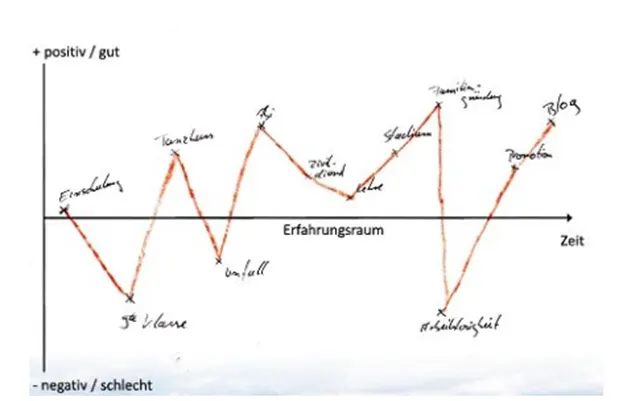Purpose—Giving Life Meaning and Being Happy at Work
According to happiness research in modern positive psychology, a deeper sense of meaning—a purpose—is one of the most important sources of a satisfying, fulfilling life. Purpose comes from using your strengths and character traits to achieve a higher purpose. In this article, we will explore what this means, how you can develop your own purpose, and how passion and purpose interact. In addition, we will also discuss the connection between purpose at work and the meaning of life, why companies also need a purpose and what role visions and missions play in relation to purpose.
"Why am I doing all this? Am I doing the right thing? What's the point of my work?" Maybe you've asked yourself these questions too. may also know that it can be difficult to stay motivated and committed to your work if you don't have a satisfactory answer to these questions. At this point, if not before, it may make sense to address the question of your own purpose.
The meaning of purpose
The term "purpose" means as much as reason, goal, meaning, or even meaning of life. The concept of the Golden Circle according to Simon Sinek helps to better understand the term and to approach one's own purpose. In it, Sinek says that to understand the meaning of a thing, a person, an organization, or a company, three questions help. These three questions are detailed below:
What kind of work do you do on a daily basis?
How exactly are you doing your job?
And why are you doing this?

Most people can answer the first two questions very quickly. Answering the question of why—the question of purpose—is much more difficult. It may take a little time and effort to answer this question for yourself, but… it's definitely worth the effort. Because current studies show: People who pursue their own purpose and experience meaning in their work are demonstrably more successful, more committed and happier than others.
Develop your own purpose
To help you get started on finding your own purpose, you can use a so-called lifeline.
A lifeline looks like this:

It portrays the highs and lows of your life. It reveals what is important to you in your life and what might be part of your "why."
Proceed as follows when creating your lifeline:
First, draw a timeline with a horizontal axis and a vertical axis. The Y-axis ranges from negative to positive. The X-axis describes your lifetime of experiences.
Enter the positive and negative experiences that have shaped your life in the appropriate category. These don't always have to be big events either, but can perhaps also be little things like "shopping support from my neighbor after the accident" or "compliments on my kindness from the salesperson at the bakery."
Connect these points with a line—this is your lifeline.
Look at all these points again and then ask yourself: What do all these points have in common? Is there a common denominator? Perhaps these points allow you to draw a conclusion about: what is really important to you and what drives you.
Let's take a look at an example. A young woman creates a lifeline for herself and enters "tutoring student improves math grade from an F to an A," "training and mentoring first intern" and "holding workshop for colleagues" as positive points on her scale. The negative items on her list are "Colleague didn't pass on information, so I looked stupid in front of management" and "Gave a single piece of false information to friend, and received strong negative feedback." This could indicate that she enjoys teaching others and sharing her expertise. She could use this knowledge to find her own professional purpose.

Passion—what is my passion?
If you want to find your purpose, you should also look at your passion—your inspiration. Passion is what motivates you and makes you feel good, such as a strong enthusiasm for a certain topic, hobby, or even a task from work. Passion usually arises because of innate talents. Your passion is something you love to do and do well without feeling stressed—feel free to think about what that looks like for you: What do I enjoy? Which of your activities does this apply to? What hobby are you passionate about? Sift through your leisure activities, your volunteering and your job. After all, people's passions are highly individualized. However, each passion can be broken down into six basic types, and they are:
Giving joy
Having skills
Performing
Creating something new
Learning and gaining knowledge
Improving the lives of others
Now you might ask yourself: What is my own passion? One strategy in particular can help you here—and that is self-reflection. Consider the following questions: What are your most important values? What inspires you—and why? With what activity (and where) do you feel most comfortable? What can you do really well? What compliment from someone else made you the happiest? What behaviors are typical for you? Be honest with yourself when answering these questions. Allow yourself to indulge your passion and do what you enjoy and what fulfills you. And then try bringing that passion into your workplace. However, even that probably won't mean you'll have fun at work every day—because there are always good days and bad days. But if you know your personal passion and consciously apply it to your job, you will be fundamentally happier with your work.

Purpose in the job = giving life meaning?
Having a purpose in your job doesn't have to give meaning to your whole life. So you shouldn't overestimate purpose in your job—it shouldn't become your "purpose in life." You can and should look for it outside of your professional life. If your job becomes your sole purpose, it could be problematic: If you change jobs or quit your job, you could lose a big part of your sense of purpose—and enter into a real crisis of questioning the meaning of your life.
That's why it's better not only to look for meaning in your job, but also to think about what drives you, what gives you strength and what you enjoy. Therefore, look for meaning in your social network, your hobbies, a volunteer position or other areas of your private life.
Corporate purpose in the company
Even a corporate purpose—a purpose for the entire company—is very important these days. It often refers to the ecological, economic and social responsibility of companies and describes the values of a company. A corporate purpose is also well received by employees. Employees appreciate the feeling that their work has an objective—it motivates them and makes them enjoy their work. They also tend to feel much more connected to their company. However, this only applies if the purpose is actually communicated and practiced in the company—i.e., being individual and authentic. A company's purpose should always be achievable and sustainable—not utopian. Ideally, it should also be simple and clearly formulated. This way, every employee can understand what is at stake and what is important to the company. So that every member of the company can contribute to a meaningful company. Learn more about the role of purpose in determining how strongly employees feel connected to the company and how it can be used to reduce turnover in our e-training on reducing turnover.

Vision, mission, purpose—are they all the same?
The purpose of a company is not the same as its mission or vision. Nevertheless, the terms are very close in meaning to each other and are often not used in a very clear-cut way. While they all somehow show the essence of a company, they are quite different. Therefore, let's try to define each term: While the mission relates to the products or services and is primarily intended to serve customers, the vision and purpose are primarily intended to inspire employees to become involved in the company. The vision is about giving the company a goal to achieve in the future. The focus is on business viability. Purpose is then primarily about the values and meaning of a company—and how the company can positively influence the world and society in general.
If you want to learn more about purpose and how to find your own purpose, we recommend our e-training Purpose—Understanding and Achieving Success.
